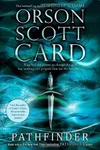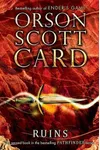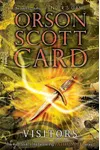Step into the mesmerizing world of Pathfinder, where time bends, secrets unravel, and a young hero named Rigg discovers his destiny on a planet called Garden! Written by Orson Scott Card, the acclaimed author of Ender’s Game, the Pathfinder trilogy is a dazzling blend of science fiction, fantasy, and historical fiction that keeps readers hooked with its intricate time-travel rules and heart-pounding intrigue.
This isn’t your typical fantasy tale—Card weaves a narrative that feels both medieval and futuristic, challenging perceptions of free will and the consequences of altering the past. Ready to explore a series that’s as thought-provoking as it is thrilling? Let’s dive in!
How Pathfinder Began
Orson Scott Card, a titan of science fiction, launched the Pathfinder series in 2010 with a vision to merge his signature complex plotting with young adult accessibility. Inspired by his fascination with time travel and human destiny, Card crafted a story set on a colonized planet, blending sci-fi concepts with a fantasy veneer. Published by Simon & Schuster, the series emerged as a bold departure from Card’s earlier works, aiming to captivate teens and adults alike with its cerebral yet adventurous tone.
The Heart of Pathfinder
The Pathfinder trilogy comprises three riveting books: Pathfinder (2010), Ruins (2012), and Visitors (2014). In Pathfinder, we meet Rigg, a teenager with the uncanny ability to see ‘paths’—traces of living beings through time. After his father’s death, Rigg embarks on a quest to find his sister, uncovering secrets about his powers and the planet Garden. Ruins escalates the stakes as Rigg deciphers the past to avert a catastrophic future, while Visitors delivers an explosive finale, testing Rigg’s abilities to save his world.
The series shines through its fusion of genres—think swords and spaceships! Themes of free will, causality, and the moral weight of time manipulation are woven into a fast-paced narrative. Rigg’s journey unfolds on Garden, a planet with medieval trappings but a sci-fi core, where human-like machines called ‘expendables’ and time-altering abilities create a unique magic system. Card’s knack for plot twists and philosophical banter keeps readers guessing, though some find the time-travel explanations a tad dense.
Why Pathfinder Resonates
Pathfinder’s impact lies in its bold storytelling and intellectual depth. Fans on platforms like Goodreads praise its intricate world-building and Card’s ability to make complex time-travel rules accessible. While not as universally known as Ender’s Game, the trilogy has carved a niche among sci-fi and fantasy readers who crave cerebral adventures. Its exploration of choice and consequence resonates in an era grappling with ethical dilemmas, ensuring its relevance years after publication.
The series also showcases Card’s evolution as a writer, blending his knack for political intrigue with YA appeal. Its cult following continues to grow, with readers drawn to its unpredictable plot and Rigg’s relatable coming-of-age arc. For those who love diving into morally gray worlds, Pathfinder is a hidden gem.
- Publication Years: 2010–2014
- Number of Books: 3
- Genre: Science Fiction/Fantasy
- Author: Orson Scott Card
Grab Pathfinder and dive into a world where time is a puzzle and every choice shapes the future! Whether you’re a sci-fi buff or a fantasy fanatic, this trilogy promises a wild ride.


